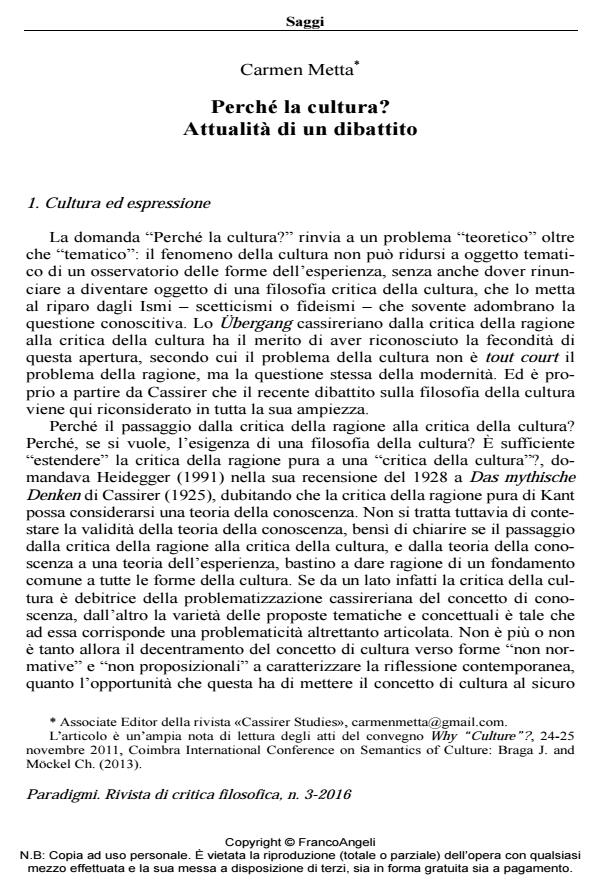Perché la cultura? Attualità di un dibattito
Titolo Rivista PARADIGMI
Autori/Curatori Carmen Metta
Anno di pubblicazione 2017 Fascicolo 2016/3 Lingua Inglese
Numero pagine 17 P. 135-151 Dimensione file 203 KB
DOI 10.3280/PARA2016-003009
Il DOI è il codice a barre della proprietà intellettuale: per saperne di più
clicca qui
Qui sotto puoi vedere in anteprima la prima pagina di questo articolo.
Se questo articolo ti interessa, lo puoi acquistare (e scaricare in formato pdf) seguendo le facili indicazioni per acquistare il download credit. Acquista Download Credits per scaricare questo Articolo in formato PDF

FrancoAngeli è membro della Publishers International Linking Association, Inc (PILA)associazione indipendente e non profit per facilitare (attraverso i servizi tecnologici implementati da CrossRef.org) l’accesso degli studiosi ai contenuti digitali nelle pubblicazioni professionali e scientifiche
The question "Why culture" calls for a rethinking of the account of culture and the method itself of the cultural analysis. The author traces back the steps of this critical path, suggesting an interpretative reading of the contributions to the conference Why "culture"?, held in Coimbra in 2011. In particular, the individuation of the three topical cores: Culture and expression, Incommensurability and interculturality, and Culture and philosophy, conveys the crucial contents of the debate across an ideal reconstruction of the Übergang from the critique of reason to the critique of culture, Cassirer’s philosophy of culture providing the framing of the recent interest in the expressive fundament of all forms of knowledge.
La domanda "Perché la cultura" introduce a un ripensamento del concetto di cultura e del metodo stesso dell’analisi culturale. L’autrice ripercorre le tappe di questo percorso critico, suggerendo una lettura interpretativa dei contributi al convegno Why "Culture"? tenutosi nel 2011 a Coimbra. In particolare, l’individua¬zione dei tre nuclei tematici: Cultura e espressione, Incommensurabilità e interculturalità e Cultura e filosofia, veicola i contenuti di attualità del dibattito sullo sfondo della filosofia della cultura di Ernst Cassirer, in una ideale ricostruzione dello Übergang dalla critica della ragione alla critica della cultura e nel segno del più generale interesse della riflessione contemporanea per la questione del fondamento espressivo comune a tutte le forme della conoscenza.
Keywords:Cassirer, Cultura, Esperienza, Espressione, Interculturalità, Modernità.
- Toulmin S. (2001). Return to reason. Cambridge, MA: Harvard University Press.
- Pavis P. (1990). Le théâtre au croisement des cultures. Paris: Corti.
- Lévi-Strauss C. (1962). La pensée sauvage. Paris: Plon.
- Heidegger M. (1991). Ernst Cassirer. Die Philosophie der symbolischen Formen. 2. Teil. Das mythische Denken. Berlin 1925. In: von Hermann F.-W., Hrsg. Kant und das Problem der Metaphysik. Gesamtausgabe. Band 5. Frankfurt a. Main: Klostermann: 255-270.
- Geach P.T. (1969). The perils of Pauline. The Review of Metaphysics, 23, 2: 287-300.
- Dempf A. (1932). Kulturphilosophie. München: Oldenbourg.
- Craps S. and Buelens G., eds. (2008). Introduction: Postcolonial trauma novels. Studies in the Novel, 40, 1-2: 1-12.
- Cassirer E. (2007). Zur Logik der Kulturwissensschaften. Fünf Studien. In: Rosenkranz C., Hrsg. Aufsätze und kleine Schriften (1941-1946). In: Recki B., Hrsg. Gesammelte Werke. Hamburger Ausgabe. Band 24. Hamburg: Meiner (trad. it.: Sulla logica delle scienze della cultura. Cinque studi, a cura di M. Maggi. Firenze: La Nuova Italia, 1979).
- Cassirer E. (2006). An essay on man. An introduction to a philosophy of human culture. In: Recki B., Hrsg. Gesammelte Werke. Hamburger Ausgabe. Band 23. Lukay M., bearbeitet von. Hamburg: Meiner.
- Cassirer E. (2004). Grundprobleme der Kulturphilosophie (1929). In: Kramme R., Hrsg., unter Mitarbeit von Fingerhut J. Kulturphilosophie: Vorlesungen und Vorträge (1929-1941). In: Köhnke K.Ch. und Krois J.M., Schwemmer O., Hrsg. Nachgelassene Manuskripte und Texte. Band 5. Hamburg: Meiner: 3-28.
- Cassirer E. (1946). The myth of the state, ed. by Ch.W. Hendel, New Haven-London: Yale University Press-Oxford University Press.
- Cassirer E. (1944). An essay on man. An introduction to a philosophy of human culture. New Haven-London: Yale University Press-Oxford University Press.
- Cassirer E. (1942). Zur Logik der Kulturwissensschaften. Fünf Studien, Göteborg: Wettergren & Kerber.
- Cassirer E. (1925). Philosophie der symbolischen Formen, Zweiter Teil. Das mythische Denken. Berlin: B. Cassirer.
- Caruth C. (1996). Unclaimed experience. trauma, narrative and history. Baltimore: Johns Hopkins University Press.
- Capeillères F. (2007). “La fondation kantienne des anthropologies philosophiques dans une anthropologie transcendantale”. In: Berner Ch. et Capeillères F., éds. Kant e les kantismes dans la philosophie contemporaine 1804-2004. Villeneuve d’Ascq: Presses Universitaires du Septentrion: 83-108.
- Burms A. (1978). Proper names and magical symbols. Leuvense Bijdragen. Tijdschrift voor Germaanse Filologie, 67: 309-317.
- Braga J. and Möckel Ch., eds. (2013). Rethinking culture and cultural analysis/Neudenken von Kultur und Kulturanalyse, Proceedings of the Coimbra International Conference on Semantics of Culture: Why “culture”?, 24-25th November, 2011. In: Düllo T. and Standke J., eds. Culture, discourse, history, 3. Berlin: Logos Verlag.
- Blumenberg H. (2006). Arbeit am Mythos. Frankfurt am Main: Suhrkamp.
- Blumenberg H. (1981b). Ernst Cassirers gedenkend. In: Wirklichkeiten in denen wir leben. Aufsätze und eine Rede. Stuttgart: Reclam: 163-172.
- Blumenberg H. (1981a). Anthropologische Annäherung an die Aktualität der Rhetorik. In: Wirklichkeiten in denen wir leben. Aufsätze und eine Rede. Stuttgart: Reclam: 103-136.
Carmen Metta, Perché la cultura? Attualità di un dibattito in "PARADIGMI" 3/2016, pp 135-151, DOI: 10.3280/PARA2016-003009